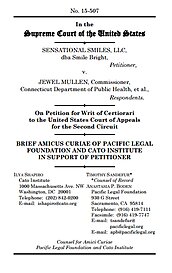Learn more about Cato’s Amicus Briefs Program.
Occupational licensing is supposed to protect consumers against people who would practice a trade without the proper qualifications, threatening public health and safety. Under today’s law, however, courts give states extremely broad deference to use licensure in whatever way lawmakers or unelected bureaucrats think best. That deference is called the “rational basis” test, and it only asks whether a state has a “legitimate” interest to restrict economic liberties. That raises a crucial question—one on which the federal courts of appeals are now divided: may government restrict economic freedom, not to protect the public, but solely to protect the private benefits of a preferred group of people? Does such “mere protectionism” qualify as a “legitimate state interest” under the lenient “rational basis” rule? The Pacific Legal Foundation and Cato have asked the Supreme Court to answer that question in a case involving teeth-whiteners: people who help clean teeth by shining a special kind of light on them. Connecticut officials ordered a group of teeth-whiteners to cease operations because they were not licensed dentists. Represented by our friends at the Institute for Justice, a teeth-whitening company called Sensational Smiles sued, arguing that forcing their staff to spend time and money to get a dentist’s license was irrational: they don’t offer dental services, after all. Federal courts are divided over whether “mere protectionism” is a constitutional reason for regulation under the rational-basis test. Six circuit courts have held that, however lenient the rational basis test may be, it still requires that the government act in the interests of the public rather than the private interests of the politically powerful. But in 2003, the Denver-based Tenth Circuit ruled that the government can use its licensing powers for “mere protectionism”—to forbid people from engaging in a business solely as a favor to those the legislature prefers. In Sensational Smiles’ case, the New York-based Second Circuit agreed with the Tenth. In our brief, we argue that the Second Circuit’s holding contradicts eight centuries of Anglo-American common law, which has held since the days of Magna Carta that however broad the government’s power may be, it has one basic limitation: it must use its powers to serve the general public, not the private interests of the rulers or their cronies. That’s not a very strong limitation—there’s a lot the government can still do that benefits the politically powerful—but it must at least aim at the public benefit. Of course, the people who will suffer most from allowing the Second Circuit’s ruling to stand are those who lack the political influence to get the government to do its bidding. These people—including members of minority groups, and poorer entrepreneurs just starting out—must look to the courts to protect their rights. By withdrawing judicial protection for the constitutional rights, the Second Circuit essentially throws them to the mercies of the very legislatures that took their rights away. Here’s hoping the Supreme Court steps in to protect the very basic right to earn an honest living.

This work is licensed under a Creative Commons Attribution-NonCommercial-ShareAlike 4.0 International License.




